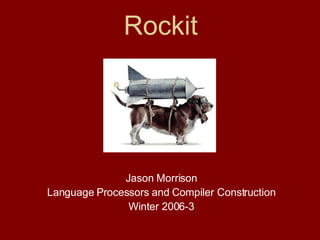Rockit: A Parser Generator for Ruby
- 1. Rockit Jason Morrison Language Processors and Compiler Construction Winter 2006-3
- 2. Ruby Rockit: Overview It used to be GLR. Maybe in the future it will be PEG. It¡¯s kind of there. Let¡¯s see!
- 3. It used to be GLR First home I found: http://rockit.sourceforge.net/ Version 0.3.8, updated October 2001 What did it look like?
- 4. Ruby Rockit: Overview It used to be GLR. Maybe in the future it will be PEG. It¡¯s kind of there. Let¡¯s see!
- 5. Ruby Rockit: Overview It used to be GLR. What¡¯s that? Maybe in the future it will be PEG. It¡¯s kind of there. Let¡¯s see!
- 6. What¡¯s GLR? Generalized LR Parse tables have multiple transitions When it hits S/R or R/R conflict: Fork parse stack Follow both paths Got a rule that produces no transition? Discard that stack.
- 7. How well does it work? Run time scales with degree of nondeterminism. O(n) on deterministic grammar. Optimize: share common stack prefix/suffix. (Leads to a state lattice rather than stack)
- 8. Ruby Rockit: Overview It used to be GLR. Maybe in the future it will be PEG. It¡¯s kind of there. Let¡¯s see!
- 9. Maybe in the future it will be PEG. Rockit 0.8.0 C-based parser, Ruby production rules Unambiguous, ? lookahead, O(n) Packrat parsing Ruby and Java grammars, analyzers, pretty-printers
- 10. Ruby Rockit: Overview It used to be GLR. Maybe in the future it will be PEG. ¡ PEG? Packrat? It¡¯s kind of there. Let¡¯s see!
- 11. What¡¯s PEG? ¡°Parsing Expression Grammar¡± No separate tokenizing phase Unambiguous (one tree for valid parse) No left recursion (as with LL)
- 12. What¡¯s PEG? Fixes ¡°dangling else¡± via prioritization Infinite lookahead via syntactic predicates Let¡¯s hear it from B ryan Ford (coined PEG) http://www.bford.info/pub/lang/peg-slides.pdf
- 13. What¡¯s Packrat? Essentially: recursive descent Memoization yields O(n) with unlimited lookahead and backtracking Packrat parsers: Java: Rats! (from xtc, eXTensible C project) Haskell: Pappy
- 14. Packrat: Since when? Theory has been formalized since the 70s Memoization was too heavy, then. Now, RAM is cheap; memoization often consumes less than subsequent compilation steps.
- 15. Ruby Rockit: Overview It used to be GLR. Maybe in the future it will be PEG. It¡¯s kind of there. Let¡¯s see!
- 16. Ruby Rockit: Overview It used to be GLR. Maybe in the future it will be PEG. It¡¯s kind of there. What do you mean by that? Let¡¯s see!
- 17. Rockit 0.7.2 Newest available Deemed 0.8.0 preview Pure Ruby (=> slow) recursive-descent parser Does not support syntactic predicates Examples are only documentation Unorganized source No error hooks
- 18. Ruby Rockit: Overview It used to be GLR. Maybe in the future it will be PEG. It¡¯s kind of there. Let¡¯s see! Let¡¯s see it anyways!
- 19. Rockit 0.7.2 Arithmetic expression example
- 20. Conclusion 0.7.2 is interesting, but doesn¡¯t have: Syntactic predicates Memoization Still denotes grammar in code. Pros: Quick, familiar. Cons: Difficult to analyze. If 0.8.0 is released as promised, should be great!
- 21. Resources These slides and I: http:// jayunit.net/rockit jason.p.morrison@gmail.com PEG ML: https:// lists.csail.mit.edu/mailman/listinfo/peg Bryan Ford: http:// pdos.csail.mit.edu/~baford/packrat Wikipedia, Google for: GLR parser, PEG grammar, Packrat parser





















